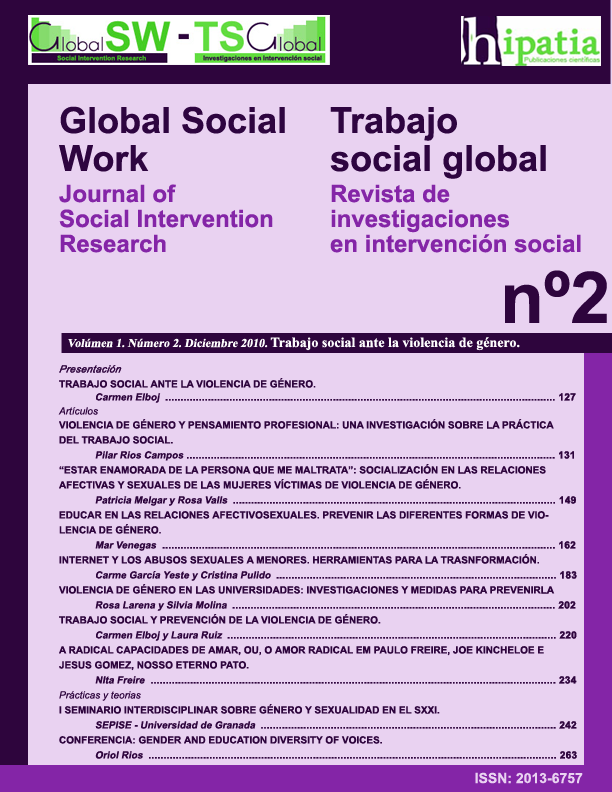EDUCAR LAS RELACIONES AFECTIVOSEXUALES, PREVENIR LAS DIFERENTES FORMAS DE VIOLENCIA DE GÉNERO
DOI:
https://doi.org/10.30827/tsg-gsw.v1i2.909Palabras clave:
Sex and relationships education, social intervention, educational action, gender violence, Educación afectivosexual, intervención social, acción educativa, violencia de géneroResumen
Las diversas formas que adopta la violencia de género continúan siendo, todavía en esta primera década del siglo XXI, uno de los problemas más flagrantes de toda sociedad. Para su erradicación, resulta imprescindible el trabajo de intervención mediante la educación afectivosexual. Ésa es la tesis que defiendo en este artículo y que ilustro mediante una experiencia a caballo entre la investigación sociológica y la acción educativa: un taller para prevenir las violencias de género inserto en un curso de educación afectivosexual con adolescentes. De este modo, pretendo dar cobertura a dos objetivos: describir y reflexionar sobre un ejemplo de intervención educativa para prevenir la violencia de género en adolescentes y, partiendo de ello, defender la educación afectivosexual como herramienta fundamental para contribuir a la formación de relaciones afectivosexuales entre adolescentes basadas en dos principios inseparables: la igualdad y la no violencia sexual y de género.
The different kinds that gender violence adopts keep on being one of the most flagrant problems of any society even at the beginning of the 21st century. In order to eradicate it, it becomes crucial the work of intervention through sexual-affective education. This is the thesis I defend in this paper, which I will illustrate by means of an experience between sociological research and educational action: a workshop for the prevention of gender violences within a course of sexual-affective education for adolescents. Thereby, I will try to cover two objectives: to describe and to reflect on an example of educational intervention to prevent gender violence in adolescents and, starting from it, to defend sexual-affective education as a fundamental tool in contributing to the formation of sexual-affective relations among adolescents based on two inseparable premises: sexual and gender equality and noviolence.
Descargas
Descargas
Publicado
Cómo citar
Número
Sección
Licencia
Las personas autoras que publican en esta revista están de acuerdo con los siguientes términos:
- Las personas autoras conservan los derechos de autoría, garantizando a Trabajo Social Global-Global Social Work el derecho a la primera publicación del trabajo que remiten a la revista para que sea sometido al preceso editorial.
- Autores y autoras conocen que su obra se publica bajo una Licencia Creative Commons que permite a otros compartirla con un reconocimiento de la autoría del trabajo y de su publicación inicial en esta revista.
- Los/as autores/as ceden a Trabajo Social Global-Global Social Work los derechos de explotación de la obra que haya sido publicada en esta revista, autorizando a la Editorial de la misma para el ejercicio de una libre reproducción, distribución y comunicación pública. Autores y autoras conocen que su obra será almacenada en servidores y reproducida en soporte digital para su incorporación a repositorios institucionales y bases de datos que facilitarán el acceso libre y gratuito al texto completo de la obra.
- Los/as autores/as pueden distribuir la versión post-print de la obra publicada en TSG-GSW (por ejemplo, situarlo en un repositorio institucional o publicarlo en un libro), con un reconocimiento expreso de su publicación inicial en esta revista.
Los derechos de copyright sobre los textos publicados en Trabajo Social Global-Global Social Work, así como la política editorial de la misma respecto al auto-archivo o depósito en repositorios institucionales o temáticos, están identificados en la base de datos Dulcinea.






















